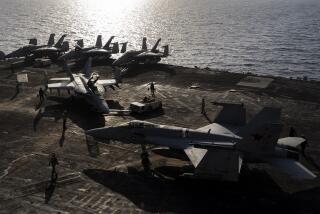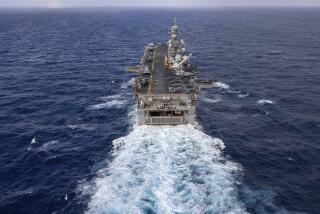Baker Hints Compromise on Gulf Fleet
- Share via
WASHINGTON — The United States may “take a fresh look” at reducing the Navy’s fleet in the Persian Gulf if the Soviet Union withdraws its own ships from the region, White House Chief of Staff Howard H. Baker Jr. said Sunday.
He added, however, that the United States will not end its 40-year policy of maintaining a naval presence in the gulf. He said ending that policy would allow the strategic inlet to become a “Soviet lake.”
“My guess is that if we took our historic naval presence out of the Persian Gulf that the Russians would soon be in with their own,” Baker said.
Soviets Urge Withdrawal
The Soviet Union called Friday for withdrawal from the gulf of “all warships from states not situated in the region.” In a statement distributed by the official news agency Tass, it said the Soviet fleet must remain there to escort Soviet vessels leaving and entering the waters.
Baker’s statement, on the ABC interview program “This Week With David Brinkley,” came as the eight Navy vessels now in the gulf prepared to begin escorting 11 Kuwaiti oil tankers, which are to be rerigged under the American flag beginning in mid-July.
The refurbished World War II battleship Missouri and three other ships are to bolster the existing U.S. fleet for the escort operation, which Kuwait sought after Iran began systematically attacking its ships in the gulf last fall. The Soviet navy also is escorting three of its own tankers, chartered by Kuwait to carry oil.
In his Sunday remarks, Baker said both superpowers could curtail their Persian Gulf forces if the U.N. Security Council can persuade Iran and Iraq to halt their 6 1/2-year war.
‘Hopeful’ on U.N. Action
He said he is “very hopeful” that the council, with the U.S. and the Soviets in agreement, will approve a cease-fire resolution later this month.
“If the two belligerent nations, Iran and Iraq, will agree to a cease-fire and a return to traditional boundaries . . . then there would be every reason to expect that everyone could breathe easier and that you could reduce the naval presence there,” Baker said.
Baker declined to predict whether the Soviets would join in a second U.N. resolution, backed by the White House, to impose an arms embargo or other sanctions against Iran or Iraq if either nation fails to heed the call to stop fighting.
“We’re not there yet. We haven’t crossed that bridge yet,” he said.
Vernon A. Walters, U.S. ambassador to the United Nations, flew to Moscow last week to discuss the Iran-Iraq cease-fire proposals with Soviet officials, who also have called for a U.N.-mediated end to the conflict. Walters’ trip follows similar visits last month by former President Jimmy Carter and U.N. Secretary General Javier Perez de Cuellar.
Reflagging Attacked
The reflagging of Kuwait’s tankers came under attack on the same ABC program by Sen. Daniel Patrick Moynihan (D-N.Y.), a member of the Senate Foreign Relations Committee, who said the Reagan Administration has no acceptable policy for freedom of navigation in the gulf.
Moynihan called for the White House to rally Persian Gulf states to a “collective position” backing U.S. ships in the gulf and opposing a Soviet presence.
“The American Navy is not for rent. The American flag is not for sale. Reflagging is a Kuwaiti policy, not an American policy,” Moynihan said.
Moynihan’s statements came as 12 congressmen met in Baghdad with Iraqi Foreign Minister Tarik Aziz to discuss the war and U.S. operations in the gulf, according to wire service reports. No details were released on the talks in Baghdad, where the fact-finding delegation arrived after visiting Kuwait to discuss the reflagging plans.
More to Read
Get the L.A. Times Politics newsletter
Deeply reported insights into legislation, politics and policy from Sacramento, Washington and beyond. In your inbox twice per week.
You may occasionally receive promotional content from the Los Angeles Times.










